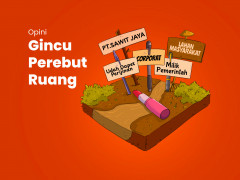Challenges to Protect Peatlands in the Village Forest Scheme in Rawa Mekar Jaya, Riau
By ZamzamiWhat about the One Million Illegal Oil Palm Plantations in Riau?
Based on data from the Ministry of Environment and Forestry’s Sipongi website, 52,481 hectares of forests in Indonesia were burned throughout 2021 until the last week of July when Pantau Gambut last accessed the website.
West Kalimantan and NTT are provinces with the largest area of forest fires, i.e. more than 14,000 and 13,000 hectares respectively. Meanwhile, Riau is in third place with an area of 6,510 hectares. In fact, at the end of last July, hundreds of hotspots appeared on areas that were regularly burned.
During the Indonesian Air Force regular exercise on 21 July, their F-16 plane accidentally discovered a forest fire in Koto Tuo, Kampar District. From the photos distributed in the media, the fire was quite extensive and smoke could be seen coming from the forest area surrounded by oil palm plantations.
The expansion of oil palm plantations is considered as one of the factors that cause forest and land fires in Riau. The expansion is not even controlled and not properly recorded by the government. The findings of the Riau Provincial People's Representative Council (DPRD) in 2015 stated that 1.8 million out of the 4.2 million hectares of oil palm plantations did not have permits. These permits include plantation business permits, forest estate release permits, cultivation business permits, and land cultivation permits.
At that time, Riau DPRD member, Suhardiman Amby, said that the potential loss of tax revenue due to the absence of plantation permits was IDR 107 trillion per year. Moreover, Eyes on the Forest (EOF), a Riau-based organization, in its June 2021 report stated that up to 59% or 5.4 million hectares of Riau's land were converted into oil palm plantations. The data was obtained after interpreting the 2019 and 2020 Landsat satellite images.
Of that number, 3.26 million hectares are identified as old oil palm plantations. The rest are plantations that grow oil palms among other plants and newly cleared lands planted with young palms or are most likely to be planted with oil palms. The report also mentioned that only around 862,000 hectares of oil palm plantations were registered at the National Land Agency (BPN) in 2016. The report concluded that in 2019/2020, up to 86% or more than 4.6 million hectares of the oil palm plantation areas in Riau were illegal.
The Riau Provincial Government responded to the findings of more than one million hectares of illegal oil palm plantations in Riau in 2019 by forming a task force. There are three integrated teams in this task force, i.e. the Control Team, Operations Team, and Justice Team. However, some non-governmental organizations in Riau have questioned the transparency of the task force's work procedure and its progress.
Besides the issue of non-transparent control of millions of hectares of illegal oil palm plantations, this scandal could have led to maladministration, law enforcement, and costs for its impact on the environment. The illegal oil palm plantations issue has become even worse when the Job Creation Law was enacted in 2020. The Omnibus Law, which was ratified quickly during the pandemic, provides that controlling illegal oil palm plantations is merely an administrative matter.
The Job Creation Law will save the owners of illegal oil palm plantations in forest areas. They can apply for a permit within three years (Article 110A) and the government provides permits for those who have actually violated the regulation. Thus, this process can be seen as legalizing environmental crimes. The ease of permit granting will obscure violations in the issuance of permits in forest areas.
This facility is added to Article 110B, which states that anyone who commits a violation of not having a business permit before the enactment of this law will be subject to administrative sanctions in the form of temporary suspension of business activities, administrative fines, and/or mandatory corrective actions. This means that there is no criminal sanction applied in oil palm investment or criminal sanction is taken as a last resort in law enforcement.
Riau Governor, Syamsuar, was right when he formed a task force to control illegal oil palm plantations, considering the aspirations raised by several parties. This action will resolve the legal issues by providing licenses to unlicensed plantations, and will also give Riau time to reorganize forest areas from the expansion of oil palm plantations.
Syamsuar needs to race against time. He has to prioritize the issue of expansion of illegal oil palm plantations in the last years of his term. This temporary halt to the expansion is urgent and he must come up with a comprehensive solution because the expansion of illegal oil palm plantations into forests or lands with deep peat soil will continue to cause forest and land fires. Clearing peatlands for plantations will be followed by peat drainage through canals and this will damage the peat ecosystem. Since the peat ecosystem is one unified whole, damage to a small part will cause damage to a large expanse.
When he became the Head of Siak District, Syamsuar understood well about the peat, oil palm, and forest fire issues. If he wants to be remembered as a governor who fulfilled his campaign promise, which is to realize a Green Riau, then he must complete the work by the end of his term, and the time is running out.*
*The author is the Coordinator of Simpul Jaringan Pantau Gambut Riau and Director of Kaliptra Andalas
**THIS ARTICLE WAS PREVIOUSLY PUBLISHED ON ONLINE MEDIA PORTAL RIAUTRIBUNE.COM ON 24 AUGUST 2021**




